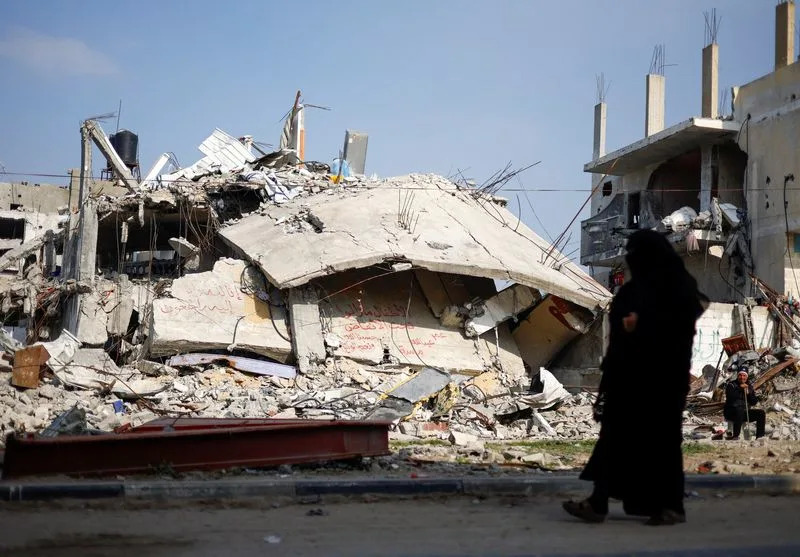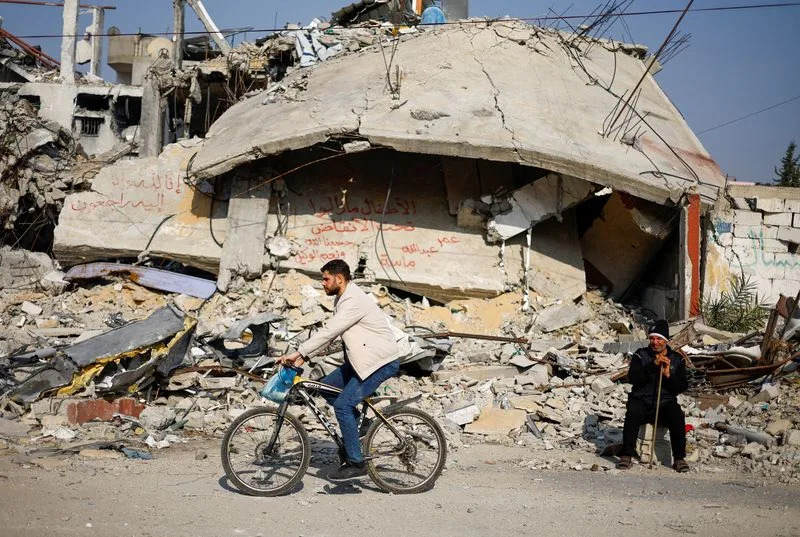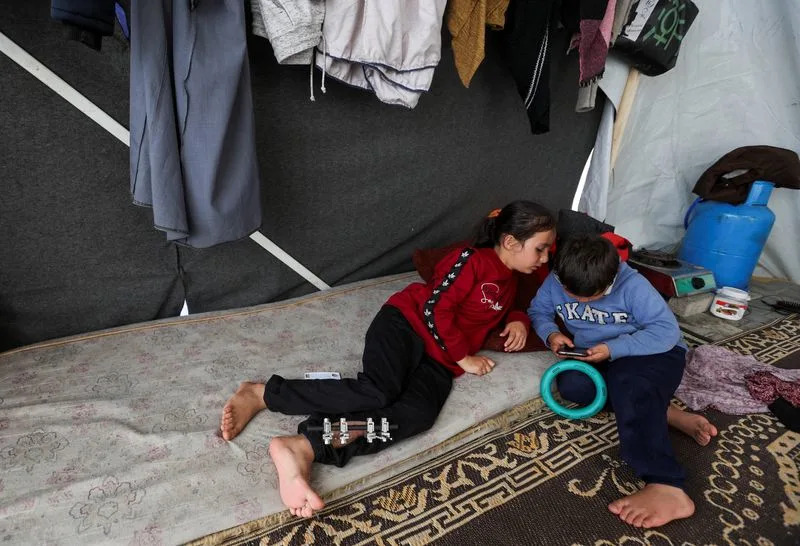Daubed in red paint on a fallen wall, the names Omar, Abdullah and Massa mark the spot where the three children were buried alive by an Israeli air strike in the Gaza Strip in November, their relatives say.
Mohammad Abu Aweidah, an uncle of the missing children, said he visits the rubble of the home in Rafah every day in the "hope one can pull out their bodies, or take a last look at their remains".
"We pray to God that we will be able to pull them out and see them," said Abu Aweidah. They were among 16 children killed in the strike that day, one of them his 18-month-old son, whose body was recovered, he said.
The three children are among thousands of Palestinians whom authorities in Hamas-run Gaza say remain missing after 100 days of war, indicating the casualty toll could be well above the nearly 24,000 deaths recorded by health authorities in Gaza.
The war, which began on Oct. 7 when Hamas fighters stormed Israel, killing 1,200 people and abducting 240 more, according to Israeli tallies, has been the deadliest in decades of conflict between Israel and the Palestinians.
Health authorities in Gaza have estimated that about 40% of those confirmed killed are aged under 18.
Abu Aweidah said his son had been "martyred in his sleep" after he'd put him to bed, asking what the infant had done to deserve such a fate.
The ground was covered in chunks of masonry and twisted metal as he visited with his young daughter.
"We have nothing left, the house is all gone, that was my father's labour, he spent 40-50 years building it and it vanished in a second, all of it, became a memory, became history, without prior notice," he said.
Nearly the entire population of Gaza - 2.3 million people - have been forced to flee their homes during the Israeli offensive which has laid waste to the territory.
Khaled Abu Aweidah, another relative, said his son Ihab and six grandchildren were among family members killed in the strike. Two of those grandchildren - Abdullah and Massa - were among the three children still missing, he said.
"We long to get those three children out from under the rubble and bury them like human beings," he said.
Ziad Mansour, a neighbour, recalled how he used to watch from his balcony as the Abu Aweidah children played. "In a blink of an eye, they vanished," he said. "They come here every day ... in hope that they can pull them out and bury them, knowing very well that they are with God."
Mohammad al-Mughair of the Gaza civil defence said residents were calling in to appeal for help to get children out from under the rubble, including from areas in northern Gaza that have been too dangerous to reach due to military operations.
He said rescue workers faced difficulties including the psychological impact of recovering bodies, especially "people who have been under the rubble for more than two months".
"Moreover, we suffer from the limited resources, especially with the malfunction of the machines and bulldozers."
Gaza's children mourn parents killed by Israeli bombardment.
When 7-year-old Laila al-Sultan wakes up at night she shouts for her father, killed in the same Israeli air strike that injured her leg in a Gaza war thought to have deprived thousands of Palestinian children of one or both parents.
She and her brother Khaled, 4, roll around on the floor of the shanty they now live in amid a tent city of homeless people, facing up to a life with no father as their mother struggles to cope in the rubble of a ruined enclave.
"The house collapsed on us and Daddy went to heaven and he is very happy," said Khaled, bouncing up and down on Laila's lap as they sat.
Three months of war have been devastating for the children of Gaza. Health authorities in the Hamas-run territory have estimated that about 40% of those confirmed killed, a figure they now put at 23,357, were aged under 18.
Most of those who survive have lost their homes. They live in shelters in schools, in tents or shanties, or crammed into still-standing houses, whole families living in single rooms. With very little food in Gaza, children are always hungry.
"We are still unable to count the numbers, but we have initial estimates of thousands of orphans. The figures are high and the challenges are big," said Ahmed Majdalani, the Palestinian Social Development Minister in the Israeli-occupied West Bank.
Laila has an ungainly metal brace attached to her injured leg and scars on her face and foot. The children play among the lines of laundry strung between tents on the sand of Rafah.
The hardship - and fear in a conflict where intense Israeli bombing of civilian areas continues - is made worse by their sadness. Laila described a father she loved "as much as there are fish and skies and everything", and who used to take her to the park and the zoo.
"My father was martyred... my uncle Awad was martyred as well as my uncles Ibrahim, Suhaib and Baha. All of us were injured, and here I am, with a leg injury," she said.
In another tent in Rafah, Ahmed al-Saker, 13, cried as he stoked a fire under a cooking pot and recalled his father, killed in a strike on their house. "He used to sing to me at bed time and hug me and hold me before I slept," he said, wiping away tears.
"My mother cannot bear all these worries and burdens and she can't carry my injured brother on her own," he said.
DARK FUTURE
Fears for the future especially mark Gazan children who lost a parent. Already forced to grow up by war, they now have to bear an extra burden of work in their hard new life in the rubble.
"My father is gone. He used to always help my mother. He used to help her in cooking and would help us study. Now he is gone, God bless his soul, and at this age I will have to bear more responsibility to help my younger siblings," said Raghad Abu Nadi, 14.
She walked among the tents with her little brother Osama, 9, who dreams of their dead father. "I used to love him so much," Osama said.
Yet still bombs keep falling. On Tuesday night an air strike in Rafah's Tal al-Sultan district killed several people including children, survivors said.
Israel's stated war aim is the destruction of Hamas, whose fighters rampaged across the border in a surprise attack on Oct. 7, killing more than 1,200 people, mainly civilians and seizing 240 hostages.
The Israeli military says it does what it can to limit harm to civilians and accuses Hamas of trying to increase the death toll by sheltering among ordinary people, something the militant group denies. Israel says the war will last months longer.
Ahmed Jarbou, sitting with his mother, clearly remembers the moment he lost his father. The family had sought shelter at his uncle's home on the fourth storey of a five-floor building when an Israeli missile struck lower down.
"My cousin was martyred. He flew out from the window of the fourth floor and crashed onto the ground. My brother's legs were amputated... and my father fell kneeling to the floor and he was martyred," 12-year-old Jarbou said.
A global day of protests draws thousands in Washington and other cities in pro-Palestinian marches
Thousands of demonstrators converged opposite the White House on Saturday to call for an end to Israeli military action in Gaza, while children joined a pro-Palestinian march through central London as part of a global day of action against the longest and deadliest war between Israel and Palestinians in 75 years.





